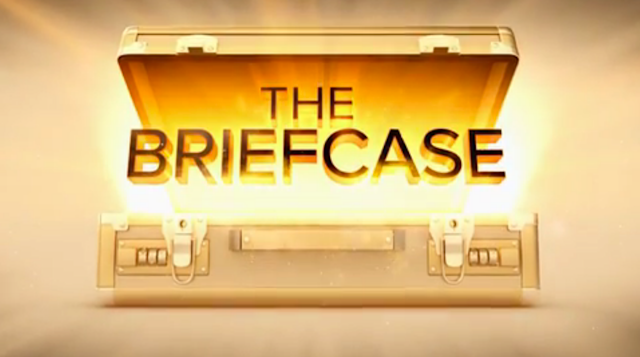The Briefcase premiered on Channel Nine last week, to immediate controversy. Criticised for leading participants to believe they would feature in a program on financial hardship, it has been called “Australia’s most exploitative reality show”.
As it comes soon after the 60 Minutes child abduction case, aired on the same network, it’s worth asking whether there are any broadcasting rules that address these concerns about deception, manipulation and exploiting vulnerable people.
Ultimately, the answer seems the same as in the 60 Minutes matter: no applicable rule or code of conduct has been broken – partially because, since last year, there are no rules in the commercial TV code specifically about reality TV shows and their participants.
But the issue in The Briefcase has more in common with a recent radio incident – the 2012 “royal prank call” on 2Day FM – than it does with the 60 Minutes story.
What’s The Briefcase about?
Two couples facing hardship of some kind are given A$100,000 and told they can keep the money, give some of it away or give all of it away to another couple. Both couples are told about the other couple’s struggles, but are unaware they were offered the same deal.
The first show, which aired last Monday, featured a family that lost their home in a bushfire, and the family of a woman who had both arms and legs amputated after a serious bacterial infection.
Criticism of the program has focused on how the producers misled participants by telling them they were going to be on an entirely different show. Andrew Backwell, the head of programming and production at Channel Nine, told the Sydney Morning Herald:
We told people we were doing a show called Making Ends Meet, in which we were going to come and speak to them about their financial situation and provide some financial advice.
It’s not clear what the participants agreed to at the outset or how this might have changed along the way. But one of last week’s participants said:
We were given every opportunity to walk away from the project before and after the surprises.
And ahead of the second episode, airing tonight, one participant told the Newcastle Herald, “it was massive for me – a good opportunity to find out who I am.”
Concern has also been expressed about the treatment and portrayal of vulnerable people facing an ethical dilemma. A focus on the misfortunes of others has led to claims of “poverty porn”.
Deception and consent
The first place to look for regulation is the Commercial Television Industry Code of Practice. There’s nothing here about the conditions under which participants are recruited to TV programs, so there’s nothing to say participants can’t be misled.
Some codes of practice do have a rule about the use of deception, but it’s usually in relation to news and current affairs, and is balanced with a right to use deceptive means where they are in the public interest.
A participant’s consent is also important. The 2Day FM royal prank call saw two Australian radio hosts pre-record a prank call to a London hospital where the Duchess of Cambridge had been admitted.
Several hours passed and attempts to retrospectively obtain consent were unsuccessful. 2Day FM went ahead regardless and broadcast the call. The Australian Communications and Media Authority (ACMA) found the radio station breached the Commercial Radio Codes of Practice, as well as a broadcasting licence condition.
We don’t know what the participants in The Briefcase agreed to, but it appears they later consented to the changed arrangements. Fairfax Media has reported that the participants it spoke to “felt they could have opted out at any stage, but they chose not to”. Whether an opt-out clause is an appropriate mechanism to address potentially serious misrepresentations is debatable.
Is the show ‘highly exploitative’?

The Commercial TV Code identifies some material as “proscribed content”. After an ACMA investigation into the infamous “turkey slap” incident on Big Brother in 2006, the Code was changed to proscribe material that was “highly demeaning or highly exploitative” and appeared to “purposefully debase or abuse a person … for the enjoyment of others”.
But this rule was removed in 2015. There are now no rules specifically about reality TV and no rules generally about treatment of program participants.
This is where the contrast with 2Day FM’s royal prank call is interesting. The ACMA found the radio station breached an equivalent rule about “highly exploitative” conduct towards participants in a “live hosted entertainment program”. It referred specifically to the use of deception.
In considering the effect on two hospital nurses who were recorded in the phone call, it said:
The broadcast used the deception of the prank to engage with the employees in a way that was personally degrading and humiliating and was likely to reduce their professional standing.
Is there a need for more regulation?
On the basis of what’s been broadcast so far, it’s hard to argue convincingly for a crack down on reality TV. The portrayal of compassion by the two couples in episode one of The Briefcase was sympathetic and moving. At least some of the participants told Fairfax Media they had no concerns over the way they were treated.
But it’s also likely the community expects at least some minimum level of regulatory oversight.
The ACMA has clearly demonstrated its ability to investigate and deliver appropriate, measured regulatory responses to the conduct seen in Big Brother and the royal prank call. (In contrast, it appears the ACMA is unable to address the 60 Minutes incident, despite demonstrated and serious harm, because no broadcasting regulations can be applied.)
When the broadcasting regulatory framework is overhauled, and as networks move to more content of this type, a general principle about the fair treatment of participants in programs like The Briefcase would work as a reminder to maintain standards in an increasingly competitive environment.
The second episode of The Briefcase airs on Channel Nine on Monday June 27.

